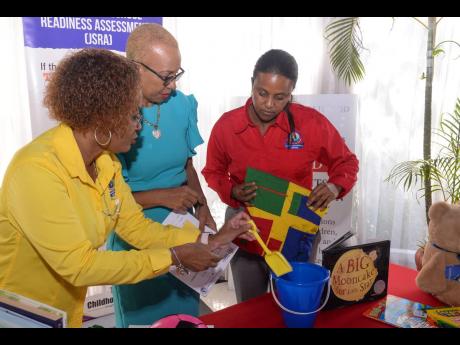New strategy engaged for early intervention in students
A new assessment strategy is being tapped to better diagnose challenges in children at the early childhood level and primarily around four years of age to allow for sooner interventions to lower the chances of them developing behavioural and learning problems at the higher levels.
Education Minister Fayval Williams said the Jamaica School Readiness Assessment (JSRA), otherwise called the H4 assessment, was conducted in the summer by a team engaged by the Early Childhood Commission (ECC), spearheaded by its executive director, Karlene DeGrasse-Deslandes.
“I am pleased that this year, in June/July of this year, the Early Childhood Commission was able to have their H4 assessment of the children in the early childhood institutions. At the end of the day, when the data is collated, it will tell us how many of our children … have issues with early learning, whether it’s early literacy, early numeracy or behavioural problems,” Williams last Thursday at the ECC Private Partners Forum at the Terra Nova All Suite Hotel in St Andrew.
The collected data is now being collated.
The move forms part of a national observational assessment of children at early childhood institutions and was done by teachers.
“I am sure if we had this data going back in time and we were tracking those children, [it would] probably be the same child you identify at age four, that now is 16 or 17 that is engaging in the kind of behaviour that we don’t want,” Williams said.
She said testing was also done for special needs, in the event children are experiencing any issues, and interventions for them are needed.
“... If the children [are] identified with behavioural issues at four years old, you can see right away where a conversation needs to be had with the parents to alert them to say, ‘This is happening to your child’, to understand the environment in which that child is living and for us to intervene in the life of that child.
Williams noted that if undiagnosed, the children would show up at primary schools with behavioural issues, which would get worse as they get older “and then we’ll see it show up in high school in the fights, in the stabbing, the violence and the indiscipline. Then we see it show up on our roads”.
Although 301 early childhood institutions are now certified by the ECC and that meets the goal of the National Strategic Plan for 2018 to 2023, Williams said the Jamaican children require more.
Also, along with the efforts of the ECC, funding will always be needed for implementation, and Williams reiterated the Government’s commitment to provide the necessary support.
“We still have a ways to go in terms of having a fully funded Government-run early childhood sector with trained professionals who understand the concept of play, who are patient, who understand developmental pathways and are able to guide and provide that nurturing for them for the hours that they are within their care,” Williams said.

